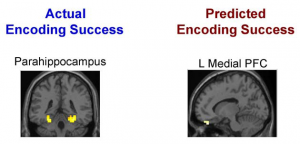
source: MIT
LiveScience.com is reporting that a new brain-imaging study performed by researchers at MIT has concluded that if you predict a memory will need to be recalled as you store that memory, you will in fact be able to remember it better later. In other words, people who make more accurate memory predictions are better learners. The opportunity for prediction does not only occur during the initial learning stage, but rather is a continuous process by which the subconscious monitors the brain to determine if something is known as well as it should be. Better learners will intuitively react to the feedback from this monitoring process and review information that is flagged as not properly understood or memorized.
During the study led by John Gabrieli of MIT, brain imaging was done on a series of subjects as they attempted to memorize something. The memory encoding area of the brain in the medial temporal lobe (MTL) was consistently active during the memorization process. Increased activity in the ventromedial prefrontal cortex (VMPFC) was also observed during memorization, but only when the subjects were “predicting” that they would need to recall the information later.
Prior to this study, it had been known that the brain does both processes, memory encoding and prediction, during learning and memorization, but this imaging provides the first insight into how the two work in conjunction with one another. Gabrieli hopes this study and those to follow will allow researchers to help people become better learners by becoming more in tune with the memory prediction mechanism.
This study appears in the December issue of the journal Nature Neuroscience.
